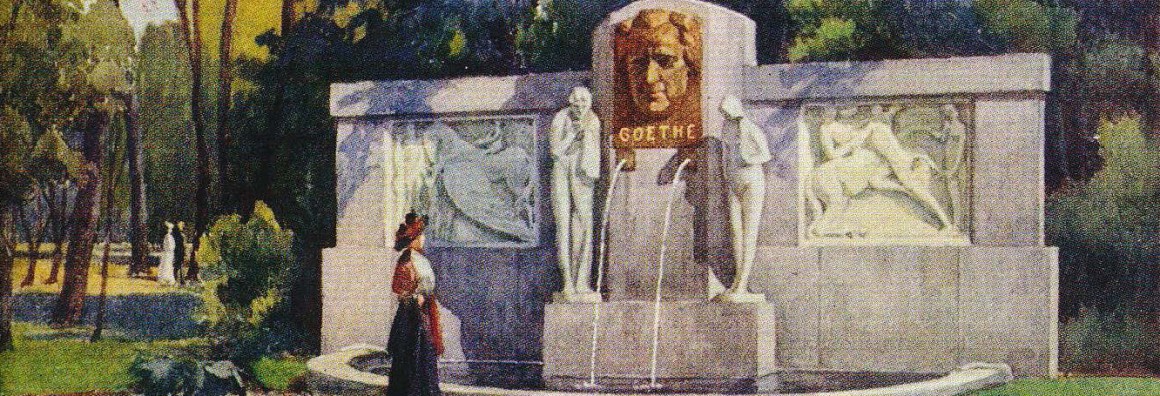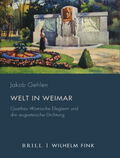
The World in Weimar. Goethe’s “Roman Elegies” and Augustan Poetry
With the Roman Elegies (1795), Johann Wolfgang von Goethe explicitly draws on a genre tradition for the first time: the Augustan love elegy. It’s an exploration into all that genre, antiquity, and Rome still have to offer around 1800. This cycle of poems seizes the infinite imaginary and textual space of Rome in a novel and distinctly ‘Roman’ way. Goethe develops a form of writing that, unlike earlier forms, is not based on either translation (translatio) or competitive imitation (aemulatio). Instead, it reverts to an endless stock of texts (captio) in a self-confident, playful, and masterful way. In its imperiality, this written captio is distinctively Roman: It deliberately appropriates foreign elements and makes them its own, thus being infinitely integrative. As a receptive and polyvalent genre, the elegy is the perfect choice for this Roman writing project. In their transformation of antiquity, the Roman Elegies are not an example for the monumentalization of tradition, but for the living metamorphosis (Ovid). In this renewed mastery over antique and modern textual layers, in this renovatio of Rome, lies a formative moment of Goethe’s worldwide authority.
The dissertation project explored the cultural and political settings of Augustan Rome—settings which, in their evocation of a ‘Golden Age,’ had a formative influence on the European classics of the modern era. The fact that German discussions around 1800 were centered less on Roman tradition and many literary theorists assumed a ‘Greek-German elective affinity’ was, for quite some time, seen as a curiosity within the German discussion of antiquity. Following his journey to Italy, however, and considering the first piece of the Horen, Goethe’s writing project proves to be Roman instead of Greek. One of the work’s central concerns lies in tracing the Roman-imperial narratives that continue in Goethe’s Elegies, narratives such as the rape of the vestal priestess Rhea Silvia through Mars. The dissertation project also explored Goethe’s mythology which was inspired by Karl Philipp Moritz’s “Language of Imagination.” Goethe sees the myth as material for his poetic production, not as an unchanging prehistory. He understands myth as a “leeway” (Moritz), which is shaped in a controlled way and guarantees the continued existence of poetry and poet. The urbanitas that emerges with the transformative and ironic use of myths touches on the incipient discussion of ‘world literature’ at the end of the 18th century. Finally, the dissertation project discussed Goethe’s work on his own figure as an author, questioning the theoretical reflections on the “literary field” (Bourdieu) and bringing together Arendt’s reflections on authority with Augustus’ understanding of auctoritas and translatio. As a ‘world author,’ Goethe cannot be understood without the ‘Roman elective affinity.’
Publications
Welt in Weimar
Goethes »Römische Elegien« und die augusteische Dichtung
Jakob Gehlen
- Römische Mythenarbeit. Goethes nachitalienisches Spiel mit Herkules, in: Goethe-Jahrbuch 137 (2020), 29–37
- Zwischen Ergreifen und Berühren. Die Rom-Ankunft des Ich in Goethes “Römischen Elegien,” in: Andrea Erwig, Sandra Fluhrer (eds.): Komparatistik online (2019). Special issue: Berühren. Relationen des Taktilen in Literatur, Philosophie und Theater, 124–146
Events
Jakob Gehlen: Gleicht Goethe Herkules? Mythos und Werkstatt in den »Römischen Elegien«
Jugend- und Kulturzentrum »mon ami«, Goetheplatz 11, 99423 Weimar
Jakob Gehlen: Augustus' Rom als Caput Mundi (Vergil, Horaz, Ovid). Rekonstruktion einer Idee
Humboldt-Universität zu Berlin, Unter den Linden 6, 10117 Berlin, Raum 3053
Jakob Gehlen/Jakob Arnold: Status der Berührung. Theaterpraxis auf und neben der Bühne
Experimentiertheater der FAU Erlangen-Nürnberg, Bismarckstraße 1, 91054 Erlangen
Goethe fountain in Františkovy Lázně/Franzensbad, historical postcard
